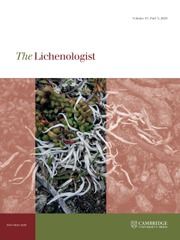Crossref Citations
This article has been cited by the following publications. This list is generated based on data provided by Crossref.
Egan, Robert S.
2010.
Recent literature on lichens—217.
The Bryologist,
Vol. 113,
Issue. 2,
p.
390.
Farkas, E.
2014.
Bibliography of foliicolous lichenized fungi, 1952–2013.
Acta Botanica Hungarica,
Vol. 56,
Issue. 1-2,
p.
33.
Sanders, William B.
and
Llop, Esteve
2020.
Gyalectidium minus Sérus., new to oceanic western Europe in the first reported foliicolous lichen community of continental Portugal.
The Lichenologist,
Vol. 52,
Issue. 3,
p.
247.
Halda, Josef P.
Oh, Soon-Ok
Liu, Dong
Lee, Beeyoung Gun
Kondratyuk, Sergey Y.
Lőkös, László
Park, Jung-Shin
Woo, Jung-Jae
and
Hur, Jae-Seoun
2020.
Two New Lichen Species, Thelopsis ullungdoensis and Phylloblastia gyeongsangbukensis from Korea.
Mycobiology,
Vol. 48,
Issue. 6,
p.
443.


